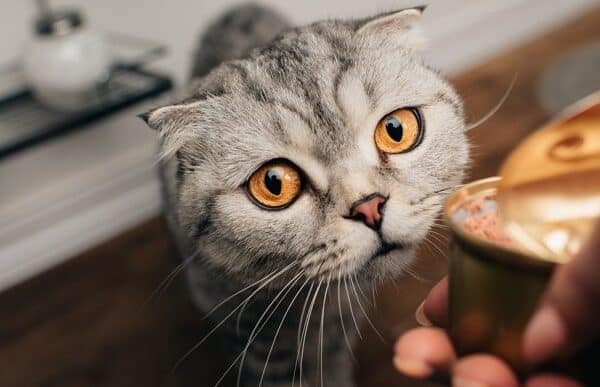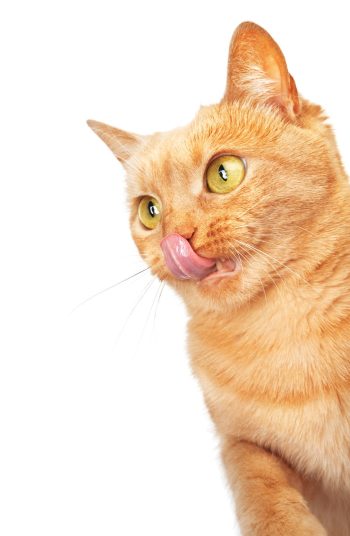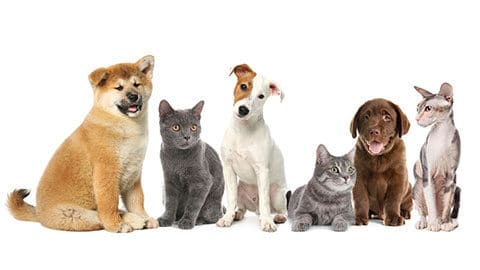
Why Are Cats So Darn Picky?
Cats tend to be super picky about their diets. Everybody knows this who has had to open three different cat food cans and watch their cat walk away with his nose in the air!
One reason for pickiness comes from a cat’s early eating experiences — they will lean toward whatever food they received as kittens. What cats are fed as young kittens, both through mother’s milk and early solids, may lead to lifelong preferences. However, if you are inheriting your cat you don’t know what his diet history has been, although it probably involved dry food which I urge everyone to avoid feeding to cats. I call all kibble “kitty crack” because it is a high-carbohydrate food that cats can get “hooked” on, even though they are obligate carnivores whose digestive systems function optimally with high-quality protein. Pickiness may happen because a cat who has eaten only kitty crack may not be familiar with the texture and taste of nice wet protein, which is the right diet for a cat.
Avoid “Kitty Crack” – or Break the Habit
As you all must know by now, I am an ardent proponent of feeding cats as though they are obligate carnivores (because they are!) by giving them high quality, low-carbohydrate canned food for the protein and moisture content. My favorite cat food is made by Weruva, with many different styles of food all made with ingredients and facilities where food for people is made, and a commitment to cats eating quality wet food. If kibble is what your cat got used to eating, then you have to transition them off dry food, which you can read more about in my book “The Cat Bible: Everything Your Cat Expects You to Know”, which has several useful tips about promoting successful feline mealtimes).
Cats Are Delicate Eaters of Small Portions
Cats aren’t only fussy about their meal selection, they are delicate eaters. Even a hungry kitty doesn’t ravenously gulp down his food (which Labrador Retriever owners are accustomed to seeing! One reason that cats can afford to be picky — and take their sweet time eating — is that by their very nature, cats are mostly solitary hunters. They can pick and choose what they’re in the mood for (for lack of a more scientific explanation!), unlike dogs who are pack animals with a natural instinct to “wolf” down their food so they can get their share. A cat has a small stomach, anyway, so really a few choice bites are all he needs to get satisfaction.

How about the taste of sweet or bitter? Research shows that cats respond less to sweetness in food than people or dogs do — plus kitties also have more receptors for bitterness, so their taste buds are programmed to be picky! Cats have fewer taste buds, but even subtle flavors — or differences between ingredients to food styles — can influence their fussiness.
The Smell of a food Matters
The smell of food influences how a cat responds, too, since cats are not as sensitive to smell as dogs are. I mention these comparisons between felines and canines because it can be easier to conceptualize this way, but of course, we all know cats are in no way ‘small dogs.” However, this helps explain why the aroma of food can be important to some cats, which is why they may not be enticed by cold food (the “other half” of a can or box right from the fridge). If that could be the cause of your kitty’s pickiness, try a 10-second zap in the microwave with a tablespoon of the food to see if that changes his attitude.
Food Texture is a Big Deal, Too
The texture of food is another consideration. Cats’ teeth evolved to rip and tear at their prey, not to grind it. People surmise this might be why some cats often prefer canned moist chunks and shreds. But there’s no hard and fast rule, since, many kitties respond best to a pate-style wet food, with the protein already blended together. A cat’s tongue — with its backward-facing spines on the rough surface, may have evolved to deal with the prey they have ripped and shred, so the tongue can be sensitive to differences in the feel of the food.
How to Break the Pickiness Habit?
All these factors add up to a finicky cat, who may react more or less enthusiastically to a variety of elements in food. Every cat is an individual and always reserves the right to change her mind about her likes and dislikes! It’s good for you to figure out your cat’s preferences with trial and error — and to deal with the rejected food, I hope you have at least one cat in your household who is happy-go-lucky and glad for anything you put on her plate!
The takeaway advice? Go out of your way to provide as much variety in your cat’s meals as you can. Multiple exposures to different styles of food and protein ingredients is the best way to break through fussiness and encourage a broader palate. When you introduce a new kind of food, put a little bit of a food style you know your cat likes on top to help him bravely leap into other items on the menu!
This blog is sponsored by Weruva, which is also a Proud Sponsor of the Radio Pet Lady Network.
(Have a comment? Share it on Facebook.)

